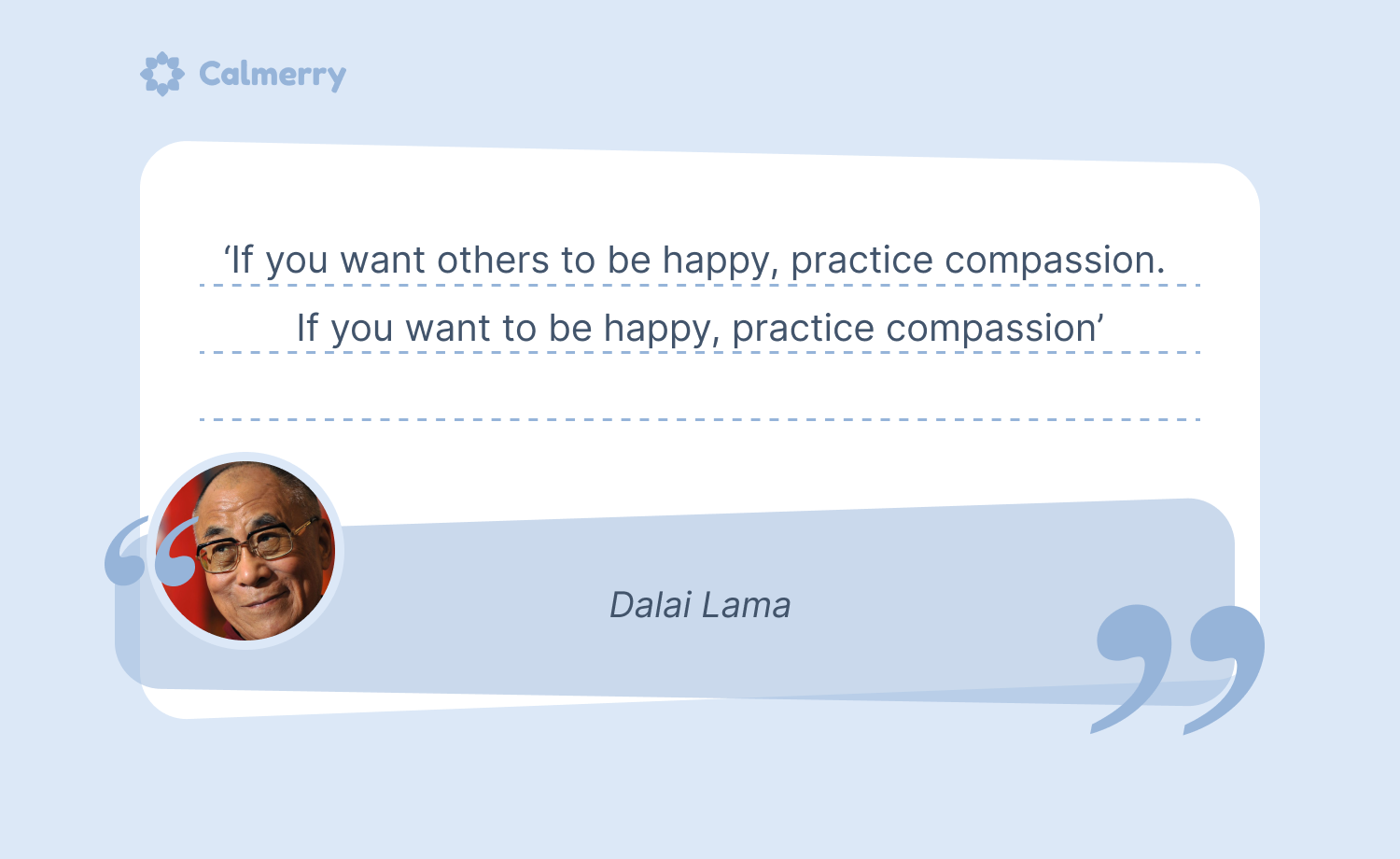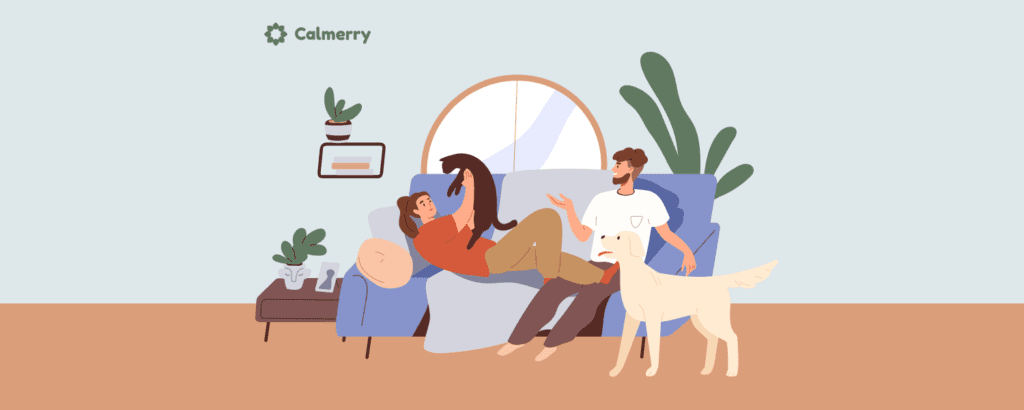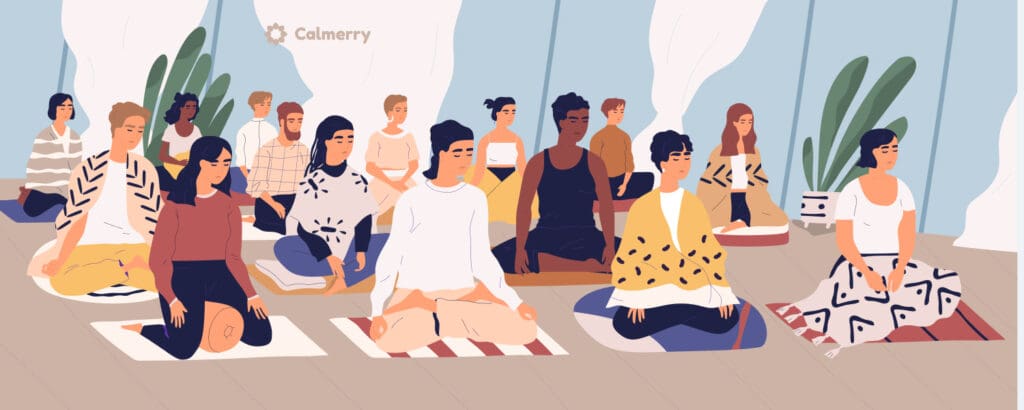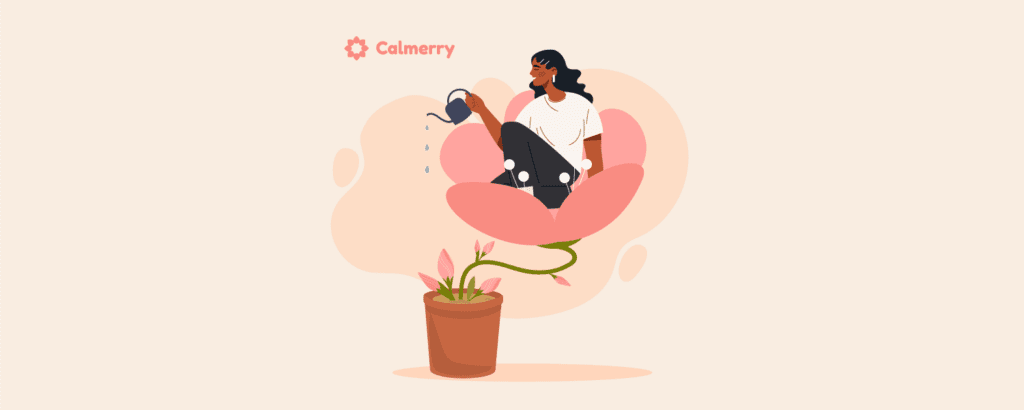You Can Sit with Us: 6 Mental Health Benefits of Being Kind

In this article
We all know that being kind makes others feel good, but what if I were to tell you that it also has the potential to improve your mental health? While there’s debate around whether altruism is part of our biological heritage, decades of research point to the fact that being unselfish can have self-serving benefits.
Still, it’s not always easy to be kind. When you’re overwhelmed, stressed, or emotionally drained, you might lack the energy to hold the door for the person behind you (or even notice that there’s a person behind you at all). Add the global pandemic–where strangers have become dangerous potential vectors of a spreading virus, and being kind can feel downright scary.
So why is being kind good for our mental health? For one, it creates a positive feedback loop between feeling good and doing nice things for other people, which adds value to our own lives and to the community around us. At Calmerry, we believe that nurturing kindness can be a powerful catalyst for improving both individual well-being and the well-being of the community.
What are the scientific benefits of kindness?
The scientific benefits of kindness have been researched for decades, though most studies have been small and fraught with methodological challenges. For one, the mental health impact of being kind may differ based on your cultural background and experiences. But the good news is, there’s no real downside to being a kind person.
Below are 6 potential science-based benefits of kindness. Give it a try for yourself and see how it feels.
Improves your well-being
Acts of kindness, including volunteering, contribute to your physical and emotional well-being. A 2020 meta-analysis reviewed nearly 130 studies of almost 200,000 combined adult participants and found that kindness was modestly but consistently linked to well-being.
In addition, the researchers found that kind people tended to have a greater sense of meaning, self-efficacy and purpose in their life, as well as higher self-esteem. Further, the connection between kindness and well-being was particularly strong for young people.
One study found that a person’s happiness can increase according to the number of kind acts that they perform–whether those acts were for themself, friends, or even total strangers. Simply observing or recalling an act of kindness was also shown to boost a person’s mood.
Increases your life satisfaction
On the surface, it might seem as though tending to your every whim and desire is the most surefire way to feel good. But the truth is, a vacuous existence based solely on chasing your own pleasure is typically not a very satisfying or even happy life.
It turns out that performing acts of kindness and practicing self-compassion have both been linked to a greater sense of life satisfaction, which makes sense. If you’re kind and caring towards yourself and are contributing to the well-being of others, you’re better able to cope with challenges and feel more fulfilled.

Creates stronger relationships
Humans are hardwired for social connection, and positive relationships are key to our mental health. Yet, our drive to connect has been stretched to its limit during the pandemic.
A recent study has found that retreating into our own hobbit holes and fraying our social connections during the pandemic may have negative mental health consequences.
Kindness and compassion can be antidotes to social isolation, as they make us feel connected, validated, and cared for. In fact, experts believe that when we feel compassion, our body releases the feel-good hormone oxytocin, and parts of our brain connected to empathy, caregiving, and pleasure light up.
Performing acts of kindness has also been linked to relationship satisfaction.
Psychologists John and Julie Gottman, two of the foremost researchers on relationships, have found that being responsive to your partner’s needs and relating with kindness and generosity are key factors that determine whether a relationship will stand the test of time.
This doesn’t mean that we shouldn’t express our anger to our partners. Rather, it “informs how we choose to express our anger.”
Reduces your anxiety and depression
Research has shown that kind people may experience less depression and anxiety. One small study focusing on adults with social anxiety found that engaging in acts of kindness enhanced positive affect.
Another small study among adolescents found that daily help-giving behaviors increased positive moods, particularly when a study participant was experiencing greater depressive symptoms.
Builds your sense of competence
A small study among college students found that doing kind deeds for others can boost your sense of autonomy, competence, and sense of connection more than simply socializing or even doing something for yourself.
When you’re having a tough time, consider doing something nice for your partner, neighbor, friend, colleague, or stranger on the street. These acts of kindness can also create a ripple effect that inspires us to be more generous and kind.
Boosts your self-compassion
When discussing The Art of Happiness, the Dalai Lama wrote, “If you want others to be happy, practice compassion. If you want to be happy, practice compassion.”

Sometimes our inner critics can be the fiercest, and we can really tear into ourselves right where it hurts. Compassion, empathy, and a recognition of common humanity are at the core of kindness.
So while you’re being nice to people around you, don’t forget to be kind to yourself.
The ABCs of kindness
What does kindness actually mean? When developing a kindness curriculum for schools, teacher Laura Pinger and psychologist Lisa Flook came up with the ABCs (actually A to G) of kindness.
- Giving your attention
- Being in touch with your breath
- Offering your care
- Depending on others
- Sharing your emotions
- Forgiving (when possible)
- Feeling gratitude
We can all benefit from strengthening our kindness muscles. Below are some methods you can use to cultivate more kindness in your life.
Journal
Imagine a time when you felt a deep connection with another person. This may have developed through a shared experience, a meaningful conversation, or a mutual passion. Write about this experience in your journal. What happened? How did it feel?
It also helps to reflect on who you turn to when you need support. What qualities do you look for in a person you can rely on? Describe a time when you were comforted by one of these people.
Tap into your compassion
Ground yourself in your breathing as you extend your compassion inward, toward a loved one, someone you’ve been struggling with, or even someone you don’t know very well.
Set the intention
Focus on a short-term, achievable goal to perform acts of generosity and kindness throughout the week–especially on days when you’re feeling low. You may be surprised to see that your mood actually lifts.
You don’t have to do anything huge or costly. Kindness can show up as a smile, a shared meal, letting someone go ahead of you in line, asking someone how they feel, and being open and curious about their response.
Take care of yourself
Some of us are so prone to attending to everyone else’s needs, we pretend that we don’t have any of our own. The problem is, if you can’t care for yourself, your energy and vitality slowly erode, eventually making it impossible for you to care for anyone else.
It’s always good to start with the basics and build from there: sleep 7-9 hours each night, eat a nourishing and balanced diet, and engage in some sort of physical activity during the day at least a few days a week. Once you’ve got that down, you can explore additional ways to boost your mental health.
Check-in with your therapist

Your online therapist can work with you to access your compassion and strengthen your resilience. You can also explore how relationships and interactions throughout your life have impacted the way you connect with others and experience kindness.
online therapy
live video session


